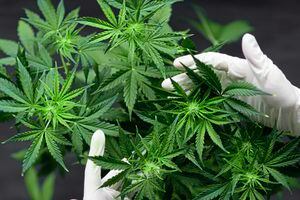Cause for celebration?
THE debate on diversification of the Guernsey economy centres mostly around tourism, fintech, MedTech, digital economy – as it should – yet a sector that has quietly emerged without too much fanfare is agriculture, particularly in the form of cannabis growing. As has been widely reported, the States of Guernsey has recently granted Celebrated Ltd the first licence to grow cannabis plants at Le Douit Vinery.

The States should be commended for their courage in supporting the introduction of a new potential growth industry to the island involving what is a controversial subject matter.
Cannabis has long been associated with the 1960s and 1970s hippy flower power culture. And yes, it is still used by many as a recreational drug, however what we are talking about here is a sophisticated and regulated crop for medicinal purposes. By doing so, the States have shown themselves to be forward-thinking and declaring the island as ‘open for business’.
The case for cannabis as a medicinal product is still under debate internationally. Use of medicinal cannabis hasn’t yet matured to the point where it is treated equally from a legal perspective globally. In fact, as the law currently provides, Guernsey- grown cannabis and its end product would be illegal to be exported or taken off the island to the UK.
There is, however, movement afoot for medicinal cannabis to enter mainstream medicine. In November 2018 for the first time, the UK’s Home Office authorised specialist doctors to prescribe medicinal cannabis to patients on a specified case-by-case basis to treat otherwise untreatable conditions. This regulatory breakthrough followed several high-profile cases where the families of a number of British children were denied the opportunity to import cannabis-based medication to treat their child’s epilepsy. The resultant media coverage and public outcry prompted government action.
In a similar vein, the driving force behind Celebrated Ltd, Tina Bolding, was inspired to start the venture in Guernsey by her experience in watching her late husband seek relief from unmanageable pain associated with cancer. If medicinal cannabis is in fact an elixir for health, then for this reason alone support for this new industry is warranted. Cannabis-based treatments have been credited with providing effective remedies for treating a wide array of conditions ranging from chronic pain, epilepsy, glaucoma and MS. There is also evidence that it is highly effective as an aid to recovery after stroke or brain injury and in helping to treat anxiety disorders.
Coinciding with Guernsey’s approval of the first licence to grow cannabis, the European Parliament has recently passed a resolution encouraging its members to consider providing increased access to medicinal cannabis. The World Health Organization has similarly moved in this direction by recently proposing that marijuana and cannabis resin be removed from Schedule IV of the 1961 Single Convention on Narcotic Drugs.
Timing is everything, and certainly the recent licence approval appears to be spot on from an economic timing perspective, giving Guernsey the opportunity to be an early adopter in a potentially high net value growth industry. Presently, the amount of cannabis grown in the UK and Europe is small relative to the opportunity. It is estimated that in response to the rapidly diminishing regulatory barriers, the market for cannabis-based medicine and materials is worth up to 116bn euros (The OECD, World Bank, IMF & World Drug Report 2018). If Guernsey was to successfully tap into a segment of this market, the economic potential is significant.
While the market is in its infancy in Europe and the UK, this is in stark contrast to Canada, which legalised the production, distribution and sale of cannabis for medicinal and recreation purposes in 2017, and has unashamedly positioned itself to be the global leader in the cannabis industry.
The Canadian regulatory framework for cannabis aims to encourage production and distribution of cannabis domestically and internationally for both medicinal and recreation purposes. This has seen an explosion of capital flow into the industry with upwards of 144 cannabis-related companies currently listed in Canada with a combined market capital value of around $57bn.
In Guernsey’s case, it’s not simply a matter of granting licences to repurpose long disused old greenhouses into cannabis growing facilities. If this was to be the model it would soon go the way of the past flower and tomato growing industries. For cannabis growing to become a viable ongoing industry in Guernsey, it will require significant capital expenditure in new purpose-built growing compounds, fitted out with hydroponic or sophisticated watering systems and impenetrable security. Even this isn’t enough to secure success. Success will require Guernsey to develop value added cannabis production processes to convert the cannabis plants into a high-end unique selling point product, highly regulated and unique to Guernsey.
While the opportunity is obvious, success is far from guaranteed. Challenges will include hiring of talent, mostly from off-island, with expertise in growing, cultivation and production of medical cannabis, identifying a niche or differentiation in what will quickly become a vibrant, congested and competitive market, creation of brand awareness in the market and identification and backing of investors who are motivated for the right reason and have the capacity and capability to see the investment through to a successful and sustainable end.
This isn’t a case of simply granting licences for cannabis growing. It’s about backing the ‘right investors’ who have the vision and proven capability to make a success of this potential market. If the economic opportunity is obvious to Guernsey, it will also be obvious to our European colleagues who have shown their ability to wipe out past Guernsey agricultural industries.
Let’s hope that the recent licence granted to the aptly named Celebrated Ltd is cause to celebrate the introduction to Guernsey of a new high value-added industry which will provide local jobs, generate economic development and result in the production of a highly unique health-based product to benefit the world.





